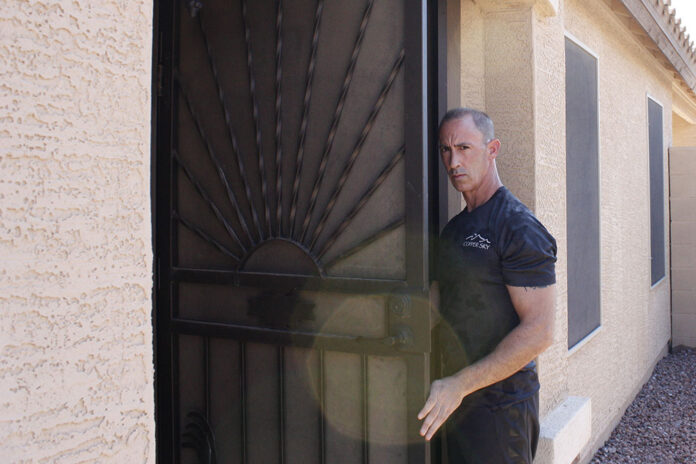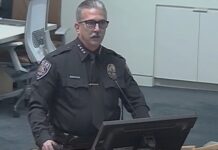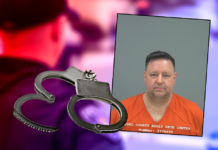
When 17-year-old Nina Sarappo, a National Honors Society member and intern at Maricopa City Hall, answered the door of her Homestead residence Friday morning, she had no idea why a group of police officers were there, one with a plastic shield and one a beanbag shotgun.
The Sarappos had become the latest victims of “swatting,” a term for the crime of making false or hoax reports to bring about large police responses. This term was popularized in online gaming communities, but has become a national problem. Ricardo Alvarado, public affairs specialist for the Maricopa Police Department, said the last time something like this happened in the city was roughly two years ago.
“That individual, if I remember correctly, he was playing an online video game,” Alvarado said.
The incident on Friday occurred after Sonya Bilevins, a DHL Express delivery driver, dropped off a package of contact lenses for Nina. A confirmation of delivery was sent by the company to her old phone number. A reply from that number sent at around 10:45 a.m. read, “Send Help, He’s got a gun, the backdoor code is [REDACTED.]”
Bilevins — who was initially unsure what to do after receiving the message — contacted the police. Officer Adam Webber and Officer Andrew Leach were dispatched at around 11:15 a.m. to perform a welfare check. They contacted Bilevins by phone and called in more officers to assist with clearing the residence, which was completed by around 11:46 a.m.
Also home besides Nina was her 12-year-old brother Christopher. Both children were on their fall breaks. Chris Sarappo, the children’s father, is a personal trainer for Copper Sky Recreation Center, where he was working during the incident. He rushed home as soon as he checked his messages.
“My kids were scared when it first happened,” Chris Sarappo said. Despite this, the two cooperated while police determined what had happened.
Police pinged the old phone number, determining it was located near a school in Tucson and was registered to a female Tucson resident identified only as Michelle in the police report.
The Maricopa Police reached out to Officer Marcos Ramirez, the school resource officer for the Tucson school. Ramirez called back around 1:03 p.m. and confirmed the phone belonged to Michelle’s son, who was a student at the school in Tucson. The student admitted to receiving the messages from DHL regarding the delivery. He said he ignored the messages but showed them to his friends, according to the police report.
Chris Sarappo wants the guilty party punished and to let his neighbors know it was a false alarm and that their family is safe and not in any trouble.
“I just want them to get to the bottom of it and to clear our name, because I work for the city,” Sarappo said. “I’ve done everything from working with kids in Tiny Tots to Challenger League with handicapped kids. I coached high school baseball and with the middle school when we won a championship. I have a lot to do with this community.”
Alvarado stressed the police response was calm and methodical. Body camera footage from one of the officers present confirmed that police knocked on the door at a reasonable level and proceeded with caution. They escorted Nina away from the house while attempting to confirm elements of the report. They did the same for Christopher Sarappo, the son.
“Slow is fast in our business,” Alvarado said. “We are still working with agencies in Pima County to gather more information on this if it reaches the level – which we’re pretty confident it may – to file charges when it comes to this type of incident.”
Maricopa is hardly alone in facing this problem. A number of celebrities have had their homes swatted in recent year, including Tom Cruise, Ashton Kutcher and Justin Bieber, just to name a few.
New Jersey State Assemblyman Paul D. Moriarty was swatted after proposing an anti-swatting bill in that states. Massachusetts’s fifth Congressional District Rep. Katherine Clark introduced the Interstate Swatting Hoax Act of 2015, before being swatted herself the next year. Despite this, she proposed the Online Safety Modernization Act of 2017, which covered a range of, “cybercrimes against individuals,” but it appears to have stalled in the Subcommittee on Crime, Terrorism, Homeland Security and Investigations since being referred there on July 14, 2017.
Nationally, swatting has led to deaths when things go wrong. One recent example saw a feud between online gamers spill into real life. A 25-year-old California resident made a hoax 911-call which resulted in the death of a 28-year-old Kansas resident.
Alvarado did offer some advice for Maricopa residents if they are ever victims of such crimes.
“If we arrive on your doorstep and we talk to you, we’re not there because we want to be,” Alvarado said. “Bear with us and we’ll work through it. We try to be as professional, as courteous and as informative as we can to help calm fears.”
He had a very different message for any would be pranksters.
“For anybody that’s considering doing this, just be aware that when we locate you, you will face felony charges,” Alvarado said.




![Elena Trails releases home renderings An image of one of 56 elevation renderings submitted to Maricopa's planning department for the Elena Trails subdivison. The developer plans to construct 14 different floor plans, with four elevation styles per plan. [City of Maricopa]](https://www.inmaricopa.com/wp-content/uploads/2024/04/city-041724-elena-trails-rendering-218x150.jpg)

![Affordable apartments planned near ‘Restaurant Row’ A blue square highlights the area of the proposed affordable housing development and "Restaurant Row" sitting south of city hall and the Maricopa Police Department. Preliminary architectural drawings were not yet available. [City of Maricopa]](https://www.inmaricopa.com/wp-content/uploads/2024/04/041724-affordable-housing-project-restaurant-row-218x150.jpg)










![Elena Trails releases home renderings An image of one of 56 elevation renderings submitted to Maricopa's planning department for the Elena Trails subdivison. The developer plans to construct 14 different floor plans, with four elevation styles per plan. [City of Maricopa]](https://www.inmaricopa.com/wp-content/uploads/2024/04/city-041724-elena-trails-rendering-100x70.jpg)